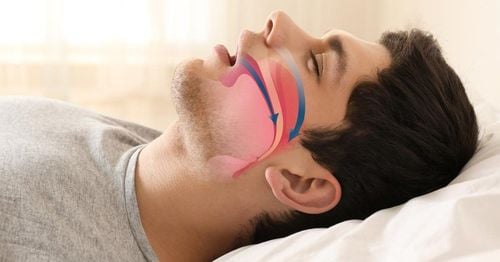This is an automatically translated article.
Sleep apnea is common in patients with brain injuries or diseases, overweight and obese people. If not treated in time, it will cause many dangerous complications such as myocardial infarction, cerebrovascular accident, high blood pressure.
1. What is sleep apnea?
Sleep apnea is a condition in which a person has short episodes of breathing that usually last more than 10 seconds during sleep.
There are two types of sleep apnea, obstructive sleep apnea and central sleep apnea. Obstructive sleep apnea is when a person's upper airways become narrow or blocked, leading to sleep apnea. Obstructive sleep apnea is the most common disease, especially in overweight and obese patients. Central sleep apnea is when your brain doesn't send the signals that control the respiratory muscle system to maintain regular breathing during sleep. This disease is common in patients with trauma or diseases of the brain.
2. Why do overweight or obese people have sleep apnea?

Người thừa cân hay mắc chứng ngừng thở khi ngủ
During sleep, pharyngeal muscles rest, tongue and pharyngeal soft tissues relax, causing partial or complete airway obstruction. In overweight - obese people, the amount of fat is distributed more around the upper airway area, leading to narrowing of the airways. This has contributed to increased airway compression during sleep. In addition, the amount of fat concentrated in the chest and abdomen area also causes a decrease in lung capacity and an increase in oxygen demand. Some studies show that a 10% increase in weight increases the risk of sleep apnea by 6 times. In another study, moderate and severe sleep apnea was observed in 11% of normal-weight men and 21% of overweight and obese men (BMI 25-30), increasing to 63% in the BMI >30 group. Similarly, for women, sleep apnea was found in 3% of the normal weight group, 9% of the overweight group, and 22% of the obese group.
Sleep apnea is also very common in patients with metabolic cardiovascular diseases such as type 2 diabetes, hypertension, cerebrovascular accident ...
3. When did you know you might have sleep apnea?
Clinical manifestations of sleep apnea are unclear, often overlooked. Common symptoms of sleep apnea are loud snoring, daytime sleepiness, and fatigue.
Some other symptoms such as headache, dry mouth or sore throat, waking up many times to urinate at night, waking up from choking or gasping, not sleeping well, feeling unfocused, forgetful
4. Is sleep apnea dangerous?

Người mắc chứng ngừng thở khi ngủ có nguy cơ nhồi máu cơ tim
Patients with sleep apnea often do not have a good night's sleep. Therefore, the patient is often tired and not alert at work.
The patient is very likely to have a traffic accident when he feels sleepy while driving.
Patients are at high risk of hypertension, myocardial infarction and cerebrovascular accident.
5. What do you need to do to detect sleep apnea?
When you are overweight or obese and have signs of suspected sleep apnea, you need to see a doctor for advice on how to diagnose and treat the disease. Respiratory polygraph or polysomnogram are two necessary tests to help you detect this disease
Currently, Vinmec International General Hospital has a Screening Package for Sleep Apnea syndrome to help detect these symptoms. present apnea, hypopnea, hypoxia in sleep of subjects at risk to diagnose sleep apnea syndrome and provide appropriate treatment. When registering for a screening package for sleep apnea syndrome, customers will receive:
Clinical examination Respiratory Clinical examination Ear, Nose Throat and respiratory polygraph, Normal electrocardiogram, To register for examination at Vinmec International General Hospital , You can contact the Vinmec Health System Hotline nationwide, or register for an online examination HERE.













